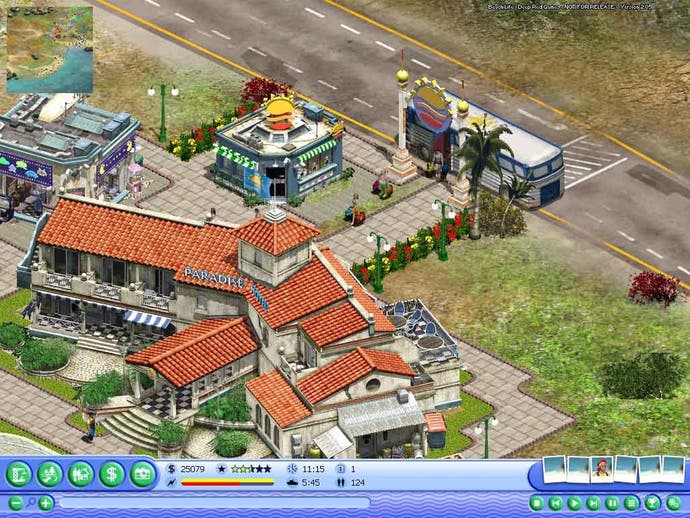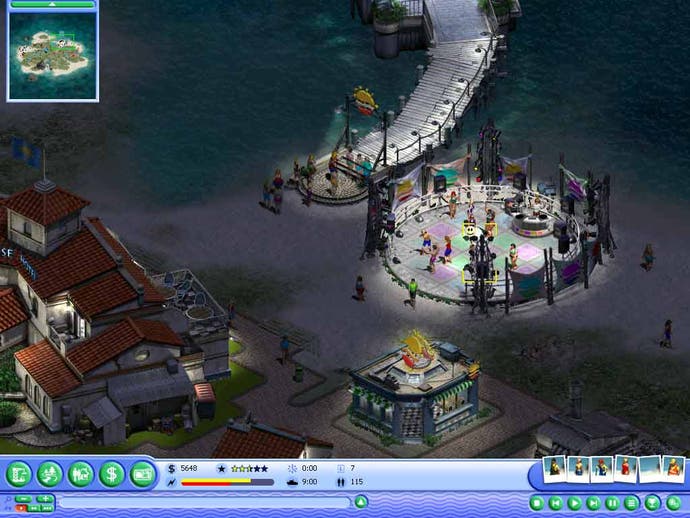Beach Life
Review - build a package holiday with Eidos
I'm probably the worst candidate to review Beach Life. In fact, any of the editorial staff at Eurogamer would be a bad choice - spending our spare time in the company of lager swilling louts and avoiding brawls on a sun kissed beach somewhere in the Mediterranean is not our idea of fun... We get in enough of a state at Christmas parties in Brighton [my head still hurts -Ed]. However, in an exit poll conducted at the clubs and bars I frequent, I was voted the reviewer most likely to hold his drink, and so I get to design package holidays with Eidos' latest peculiarity, Beach Life. The others are off to Spain on the company card to build up their stamina. Apparently.

Sex on the Beach
Let's get the obvious point out of the way first - Beach Life is, for all intents and purposes, RollerCoaster Tycoon Ibiza-style, albeit without rollercoasters, or rides, or... oh shut up, you get the idea. Instead of the ability to construct rides, you have an assortment of different types of restaurants, cafés, bars and Ebola-riddled beach barbecues alongside tacky souvenir shops, water sports and amusement arcades.
Your progress through the game relies on your ability to successfully fulfil mission objectives on the game's fourteen islands. These objectives range from simply attracting a set quota of guests to your resort, to restricting drownings to a certain degree and getting couples to fornicate on the beach. How lovely. Your goals are always achieved through clever construction and placement of buildings and scenery though, and a great deal of care and attention needs to be put into what type of buildings you build, where you build them and when. Mission objectives where you need to attract a certain type of clientele for example, such as those of particular affluence, rely on distinct types of attraction and it's down to both common sense and trial and error to find out exactly what they are.
Sometimes, you'll need to build a resort from scratch, and this is when the game is at its most demanding as you rush to get all the budgeted amenities and entertainment up to scratch as quickly as possible. This of course means hiring staff to take care of it all, and each type of staff from holiday reps to cleaners require their own type of building, and other building types are in turn reliant on the construction of staff facilities - the beach barbeque is reliant on the construction of a cleaners hut, for example. The way the constructions interlock and rely on each other adds a certain amount of confusion and an extra level of stress, as the guests can be nagging for something which you can't build because you can't afford another prerequisite. You can guarantee that your first few days of business will be disastrous as your funds are emptied and the guests remain unsatisfied, which can be frustrating.

Tiny Life
Visually, Beach Life is pretty unremarkable. Everything is pre-rendered and the islands themselves are devoid of animation, which is particularly disappointing as they're nicely realised for the most part. The small characters are well detailed and come with an assortment of amusing animations as the guests (ahem) go through the motions, and thanks to the game's ability to focus on single characters and follow them around they can be quite good entertainment... for about five minutes - The Sims this is not.
The game is pretty unsurprising on the audio front as well, with the usual crowd murmurings punctuated by the hum of equipment, the sizzling of burgers and the gurgled yelps from unfortunate drowning citizens (much to our continued delight). Thankfully, Deep Red coded an MP3 player into the game's interface and managed to include some music from the likes of Kinobe, Alexkid and Laurent Garnier which is nice, if you like that sort of thing. If you're anything like me though, you don't, and thankfully to this end you're able to include your own mp3 collection in the game. Phew.
Beach Life is good at what it does for a little while, but as is usually the case the novelty wears extremely thin extremely quickly. What a game like RollerCoaster Tycoon has over Beach Life is the ability to customise most of your attractions, and has a major boost in being able to design coasters and water rides with almost infinite possibilities, but this is inherent to the theme park scenario and Beach Life couldn't hope to compete with that with only a complement of static buildings, pot plants, fountains and surf shacks to keep you interested. Offering a set variety of buildings without being able to research new kinds of attraction also dulls the experience somewhat, and by the time you're halfway through the game you're ultimately left with a repetitive and pretty unrewarding experience.

